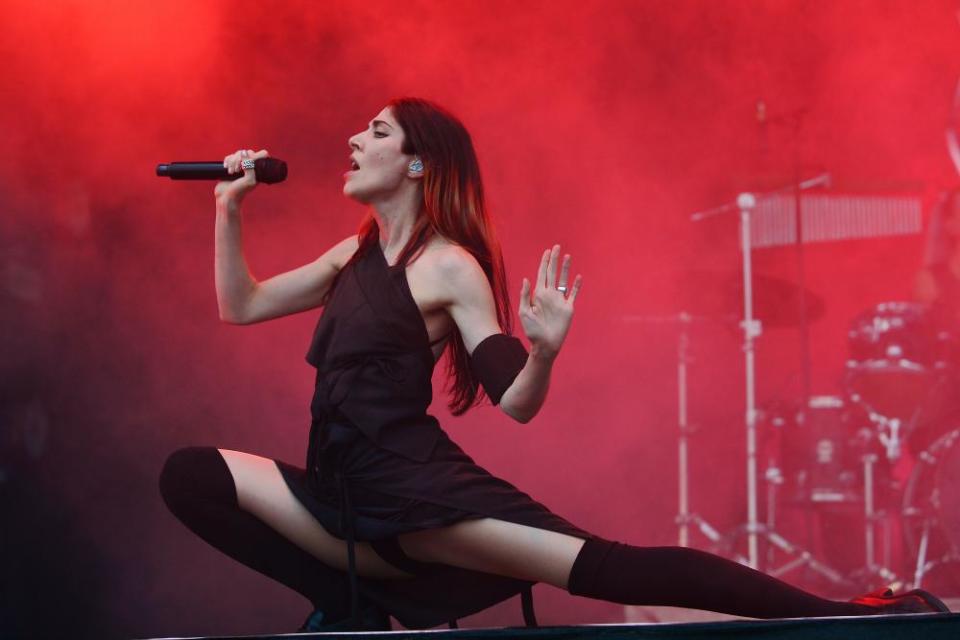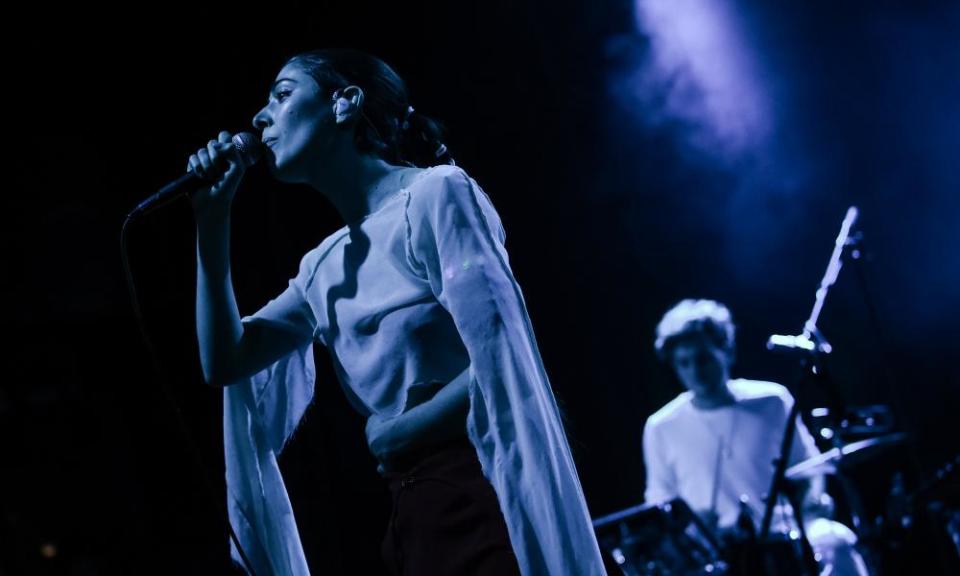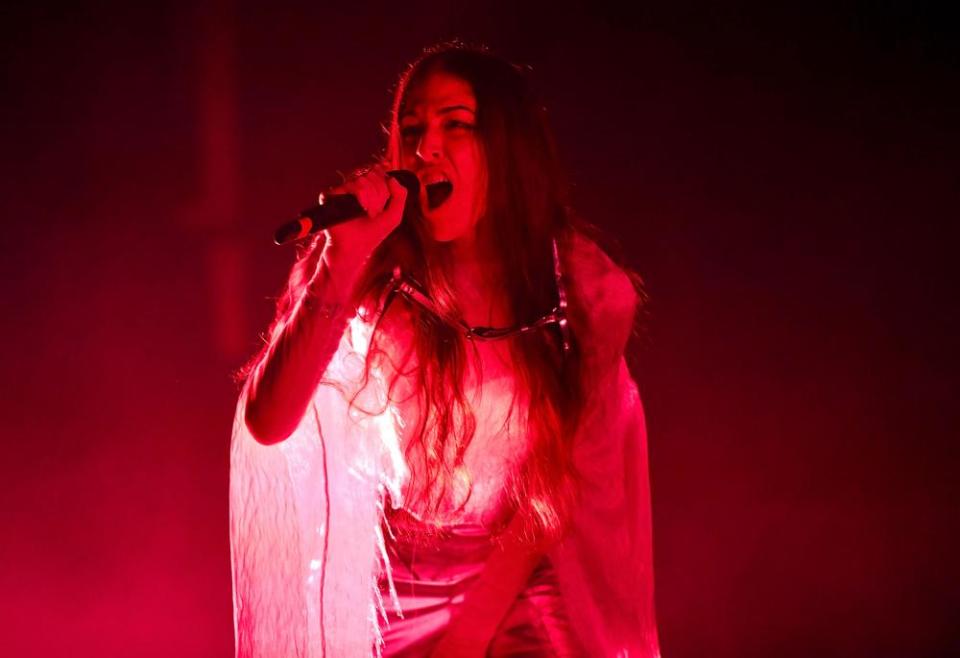Caroline Polachek: ‘Seeing Fiona Apple and Björk succeed without compromise felt so aspirational’
A few months ago, Caroline Polachek was filming the music video for her 80s pop fantasia Welcome to My Island, trying to explain that her makeup needed to capture “the mania that comes with desire and striving”. “I was like: ‘I need to look desperate and pathetic,’” she says. Her reference point was someone “crawling out of a house party”, mascara bleeding on to their cheeks. Her glam team were bemused. “Excuse me?” she recalls them saying.
Her directive was firm. A musician for nearly 20 years – from indie darling in Chairlift to songwriter for Beyoncé, ambient experimentalist and now alternative pop star – Polachek, 37, has perfected the art of writing songs about the kind of emotion that, as she describes it, “doesn’t fit in the world”. With its crisp guitar solo and howling vocals, Welcome to My Island takes that idea to the next level, evoking the “side of vulnerability and openness that’s not always pretty”. It’s not darkness, she says, but “an essential part of being alive”.
Related: Caroline Polachek: ‘Women in music are taught that once you’re 35, you’ve expired’
This is Polachek’s speciality. Her acclaimed debut solo album, 2019’s Pang, dealt in adrenaline-rush feelings good and bad: love, loneliness, euphoria, panic. Its onomatopoeic title and woozy, glittering sound touched on the feeling of freefall she experienced during a period of intense upheaval that saw her get divorced and find a new partner. Her big feelings struck a chord during the shut-in months of the pandemic, spawning a viral single in the knowingly exaggerated So Hot You’re Hurting My Feelings, while her operatic vocals (like an alien take on Céline Dion), theatrical aesthetic and immaculate perfectionism captured a huge young fanbase.

Before Running Up That Hill returned to the charts, Polachek was shaping up to be something like Gen Z’s Kate Bush – a producer and vocalist interested in music that’s formally eccentric and unapologetic about her own too much-ness. “Emotions and pure expression and energy spilling and splashing out all over the place – I find it a very musical idea,” she says.
Polachek and I are speaking in early January, six weeks before the release of her second album, Desire, I Want to Turn Into You. Ratcheting up both the fantastical elements of its predecessor as well as its humour and pop instinct, Desire is an eclectic, elaborate and cheekily deranged sequel, and one of the year’s most anticipated releases: after the remarkable success of Pang – as well as her buzzy collaborations with Charli XCX, Christine and the Queens and Flume – it feels as if Polachek is finally reaching critical mass as a solo artist.
Speaking from her home in Los Angeles – where she and her boyfriend, artist and Kurt Cobain opera librettist Matt Copson, live half the year (the other half they spend in London) – Polachek describes Desire as “a very maximalist album”. It features bagpipes, Spanish guitar and beats that run the gamut from trip-hop to dembow – the result of her wanting it to feel “very soulful and alive” and in touch with the chaos and upheaval of the pandemic. “This Obama era of imagined stability is actually very unnatural,” she says. “This state of migration and stress and mortality – and this mysterious relationship with the virus and weird superstitions and pseudoscience and stuff that comes out of it – is all so universal, and has been the backdrop for so much art-making throughout all existence. I felt very connected to that.”
Early on during the pandemic, Polachek experienced that “stress and mortality” first-hand. She caught Covid early on, days after a show at London’s Heaven nightclub on 11 March 2020, documenting on Instagram the then unfamiliar symptoms as they developed. Shortly after, her father contracted the virus: he died in April, age 75. Polachek has said that “saying goodbye to him over FaceTime was one of the most painful experiences of my life”.
The pair had a complicated relationship. He was a professor of Chinese history at Columbia and Princeton universities, and later worked in finance. Despite the acclaim and success she earned in Chairlift and solo, she says he never came to see her play and “never approved” of her art, finding her music “too pop and too commercial, and therefore less authentic because it wasn’t insurrectionist or radical enough”.
She delves into their relationship on Welcome to My Island, which she describes as “manic as fuck”. It finds Polachek comparing herself to her father. In the frantic bridge, she half raps: “I’m my father’s daughter in the end / He says, ‘Watch your ego, watch your head, girl / You’re so smart, so talented / But now the water’s turning red / And it’s all your fault, and it’s all your mess.’”
Polachek’s father had struggled with depression and bipolar disorder, and had “completely failed at being able to take care of himself in any of the most essential ways”, she says. “That section was really an exploration of all these ways in which we’re failing and imperfect – you tend to one side of your life, but then you turn around and the other is collapsing.” She thinks her father would have appreciated how the verse “did justice to the situation in its honesty. It felt important to sort of include this idea of hereditary mania and imperfection, and also empathy in that way – we’re always sort of treading water our whole life, right up till the end.”
The idea of spiralling – whether in terms of musical flow or psychological state – became key to Desire. Rather than set aside time to record, she and co-producer Danny L Harle took a fluid approach to making the album: it started life in their Covid bubble in London, in the early days of the pandemic, and they finished it over the subsequent two years, recording a lot of it in hired studios while Polachek was supporting Dua Lipa on tour.
Growing up listening to artists like Fiona Apple, Kate Bush and Björk and seeing these women who claimed a lot of attention, seemingly without compromise, felt so aspirational to me
“Everything had to happen out in public and once the material started developing its own personality – these sprawling, longform structures and playful, abstract lyrics – I realised the content and the form are very related,” she says. Last summer she tested the waters with the sexy, darting Bunny Is a Rider, which matches a lithe funk bassline with a dembow beat, to instant rapture. She calls the song “a very direct manifesto of my being decidedly unavailable … being offline and off grid, I think that’s the sexiest thing ever.”
Polacheck calls other songs on Desire experiments in “lateral spiralling” – “writing something that had no verses and no courses, just pure flow, where I enter the song and I’m just vibing”, she says, creating a horizontal corkscrew with her finger – while others, such as the verdant Blood and Butter, are about “spiralling upward”. Polachek explains: “The upward spiral is maybe the closest thing we can experience to heaven – a kind of heaven on Earth, which we feel in moments of total selflessness and falling in love. They’re really the moments where you feel yourself turning into something else.”
This sort of heady earnestness is part of Polachek’s appeal: her lyrics prize fragility, beauty and metaphor, a rarity in a modern pop landscape that tends to be literal and diaristic. (One typically brilliant Polachek simile on Pang described waiting for someone to reciprocate your crush as “feeling like a butterfly inside a plane”.) Although she won’t be drawn on the specifics of Desire’s lyrics – and, regardless, many of them feel free-associative or collagist – Polachek is curious and witty when discussing desire as a concept. She is prone to taking long pauses, looking away from her webcam before turning back with a glint in her eye. When I ask her about a recurring paradox on the album – the desire to need nothing – she responds like we’re friends trying to tease out the mysteries of life together: “That’s part of the illusion of falling in love – feeling as if you could live off that like air or water. That’s the most manic point of falling in love, isn’t it?”

Polachek matches these dizzying expressions with outlandish, almost distasteful, aesthetic clashes: there are children’s choirs and flamenco guitars; Ray of Light-style trip-hop sits next to Celtic folk and sunny, early 00s-style radio pop. She says that much of the album’s sound was inspired by the feeling of being in a city and “having daily life washing over me” – she describes one song, Pretty in Possible, as feeling like “twisting through a crowd of people [in a] neutral, headless state”. Although her trademark upper register – as she’s joked, “haters will say it’s Auto-Tune” – appears a lot here, so do new parts of her voice: a breathy and rhythmic lower tone, a honeyed midrange. Polachek draws the 00s pop blockbuster moments back to her “earliest archetypal euphoric moments with feminine pop”.
I wouldn’t be the artist I am without my autonomy – I’ve never had a suggestion box, and I never will
As a child, listening to windswept hits by the likes of Sophie B Hawkins or Céline Dion made Polachek feel: “Oh, these are songs that have a soul, that can take care of me.” It wasn’t that she thought they were “particularly cool, but that there was something very solid about them”, she explains. “Some moments on this album are me really reaching to see if I can do my own version of that feeling of solidity or arrival or heart.”
The song Smoke captures that warmth: Polachek’s voice brims with passion and devotion (“You are / The big answer tonight”) over synths that buzz like neon bulbs. “I really wanted to have some undeniable, anthemic diva moments, and so I was really picking apart what I’m interested in about those [artists]. It’s not a bombastic sound, it’s not vocal flexing, it’s something else. What is that quality? And where’s the fine line where it goes over the edge into becoming horrible, versus feeling really gorgeous and comforting and soulful?”
Related: Bring it all back: why naff noughties pop is suddenly cool again
In trying to find that line, Polachek is in conversation with a number of other A-list stars who have evoked 00s pop recently, Lorde and Haim among them. That, coupled with Pang surprisingly landing a single in rotation at BBC Radio 1, suggests that Polachek may be in spitting distance of more mainstream success. But she says she’s not gunning for arenas. While she loved the “potency” of what she witnessed on tour with Dua Lipa – “there’s so much vitality and positivity in her music, and she totally embodies it in her philosophy and as an athlete” – she tries “not to think about the material or lifestyle connotations that come with that”, and describes the idea of dealing with paparazzi as “absolute hell”.
This isn’t the first time Polachek has been struck with a “next big thing” tag. Chairlift, her first band, broke through with Bruises, which was featured on one of the classic iPod ads and earned them a deal with Columbia Records. Polachek quickly became known for her unique voice and adventurous musical instincts: she collaborated with everyone from Dev Hynes to SBTRKT, co-produced and co-wrote a song for Beyoncé and No Angel, and featured in a Calvin Klein campaign.
After Chairlift broke up in 2017, so that she and bandmate Patrick Wimberly could pursue solo ventures, Polachek essentially started over thanks to Pang. In late 2019, she played a 200-capacity launch show in LA; by mid-2021, she was headlining the city’s 6,000-capacity Greek Theater. While stadium fame doesn’t appeal, this kind of evolution on her own terms does. “I’ve always really believed in the idea of alternative with a capital-A,” she says. “Growing up listening to artists like Fiona Apple, Kate Bush and Björk and seeing these women who claimed a lot of attention, seemingly without compromise, felt so aspirational to me. Growing this project is a cool adventure: how can I do it in a way that feels like I still have all of my creative sovereignty and also my privacy?”
Sovereignty is one thing; privacy, an entirely different beast. Polachek is now one of the many niche pop stars with ardent stans tracking her every move. She says that she finds stan culture “so generative and creative” and is grateful for the “porous and emotional relationship” they share. But she is keenly aware of the toxicity it can generate. “There is so much deep-seated misogyny in stan culture and I think the idea of ownership is really toxic – the idea that because I have streamed your music, I own you and you owe me things,” she says. “I wouldn’t be the artist I am without my autonomy – I’ve never had a suggestion box, and I never will.”

She continues: “I think there’s this expectation that female pop musicians can be puppeteered by our fanbase, and I want nothing to do with it. I don’t envy bigger artists who have to contend with a really aggressive wall of voices telling them how to live their lives – I will reject that at all costs.”
Polachek brings up Lana Del Rey and Rosalía as contemporaries who she sees carrying on the freethinking legacy of Bush and Apple. Del Rey seems to have drawn a potential blueprint for an artist like Polachek: one of the most-streamed and most-influential artists of her generation, she worked her way to the centre of pop without any real chart success or radio support. It’s not hard to see Polachek following a similar path.
For now, though, she’s relishing seeing her desires become reality. “When we started the Pang cycle, I could barely afford a little backdrop that was half the size of this wall behind me,” she says. “Now I can build a landscape on stage and really bring my ideas to life with music videos. Thinking about that makes me really emotional, because it’s something I’ve wanted my entire career – and now I have it.”
• Desire, I Want to Turn Into You is out 14 February on Perpetual Novice/The Orchard.

 Yahoo News
Yahoo News 
